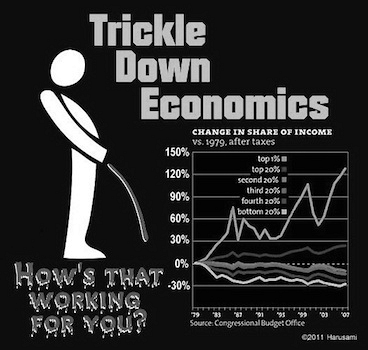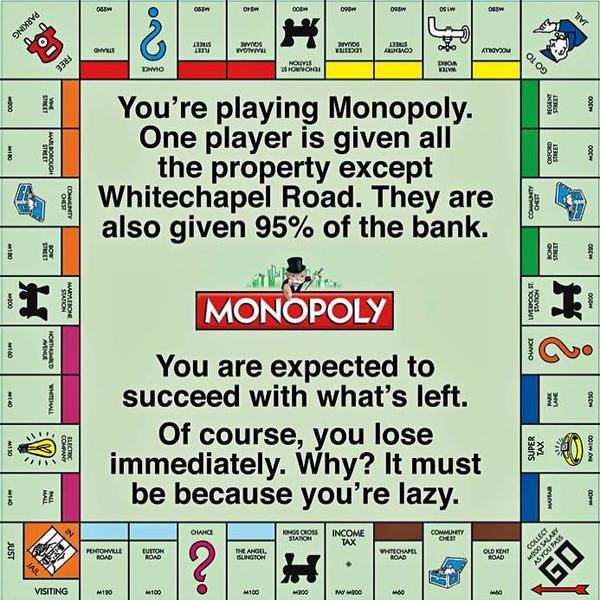Search
Democracy Links
Member's Off-site Blogs
trickle down economics .....

Investment as a consequence of falling returns is drying up. If that trend continues then the Australian economy is headed for a major fall. John Passant questions whether capitalism is the problem along with mainstream media misunderstanding the crisis in Australian politics.
I have just renewed my Canberra Times subscription. It got me thinking, about newspapers, about the role of the media, and about changes to the Canberra Times itself.
There is a changing media environment. I can read most of the articles I am interested in online, for free. My Facebook friends do a good job of highlighting which are the best political articles to read, not just from the Canberra Times and other mainstream media but social media too.
Therein lies another problem. Social media, or at least sections of it, provides a better range of political articles, which provoke and challenge my thinking in ways that mainstream media usually no longer does.
John Howard supposedly called the Canberra Times “the Fyshwick Pravda.” This reflected his own reactionary world view but had some grounding in truth in that the Canberra Times in the past challenged governments of both persuasions and displayed, inconsistently, some sort of mildly left of centre approach.
Today, it has jumped to the right. Apart from conservative apparatchiks like Amanda Vanstone and Barnaby Joyce, the centralisation of Fairfax media has resulted in a preponderance of The Age and Sydney Morning Herald articles becoming Canberra Times’ reports and opinion. This might save money and presumably is part of some strategy to shift the paper to “the centre” but misunderstands the crisis in Australian politics.
In Labor and the Liberals, we have a set of neoliberals offering us slightly differing versions of austerity, restrictions on working class and trade union activity and encroachment on civil liberties. Couple this with a “nudge, nudge, wink, wink,” mix of racism and Islamophobia and the loudening drum beat of national security and we have an emboldened right wing of politics. This right wing cohort is actually divorced from and at odds with the majority of the population on almost every issue, apart from the “othering” of refugees.
On climate change, on jobs, on social spending issues like public health, education and transport, and social issues like same sex marriage, the public are well to the left of their parliamentary representatives.
The glue of othering Aborigines, Muslims and refugees cannot hold that fundamental imbalance together forever. Mainstream media, as a major element in the capitalist system, and the propagandist of capitalist ideas day in day out among the mass of people – ideas that do reflect in part the lived reality of workers in society – must of necessity be part of that separation of the politicians and the majority of people and the process of papering over those differences by echoing the othering.
Yet it is the very essence of the lived reality of capitalism that sees workers yearn for a better world, one with improved health care and public education, better roads and train lines, looking after pensioners, the disabled and equality for gays and lesbians.
This social democratic yearning crashes into the reality of capitalism and the reassertion since the late 60s and early 70s of the tendency of the rate of profit to fall.
The election of Thatcher and Reagan saw the disease of neoliberalism infect the U.K. and the U.S. In Australia, the Hawke and Keating Labor governments introduced and deepened these neoliberal solutions, with the help of the trade union bureaucracy. Arguably, this class collaboration made the ALP more successful in terms of shifting wealth from labour to capital than Thatcher or Reagan could ever have.

Worryingly, for the Australian ruling class today, recent Australian Bureau of Statistics figures about capital investment show a marked decline as the hurdle rate for investment (what is an acceptable rate of return on investment) remains above the real rate that can be secured. Falling profit rates see capital not invest or seek out other pastures for investment if it can. Investment as a consequence of falling returns is drying up.
If that trend continues then the Australian economy is headed for a major fall. This all means that whoever is in government in Australia will adopt and ratchet up attacks on wages, jobs, conditions, and social spending. To try to hide this reality, the attacks on the manufactured “enemy within” will intensify and broaden to attack even more welfare recipients and perhaps the left. The terrorist threat will dominate our news when the biggest terrorists sit in Canberra and Washington.
The mainstream media will cheer on the multitude of attacks on the working class. Nowhere among the reams and reams of “analysis” of the economic issues facing “the nation” will there be published alternative voices that identify capitalism as the problem and production organised democratically to satisfy human need rather than make a profit as the solution.
This article will never see the light of day in the mainstream media.
John Passant is a PhD student in the School of Politics and International Relations at the ANU and a tutor this semester at the University of Wollongong. He blogs at En Passant.
Is capitalism the problem as falling returns dry up?
- By John Richardson at 9 Jun 2015 - 2:51pm
- John Richardson's blog
- Login or register to post comments
Recent comments
6 hours 50 min ago
8 hours 43 min ago
9 hours 46 min ago
10 hours 18 min ago
10 hours 55 min ago
11 hours 21 min ago
11 hours 30 min ago
12 hours 42 min ago
15 hours 4 min ago
1 day 50 min ago